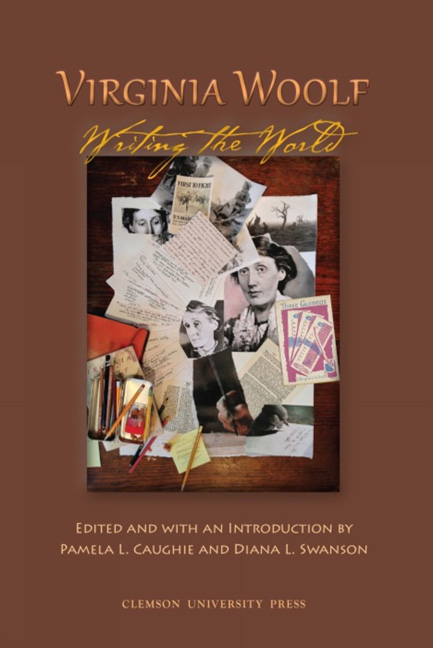Book contents
- Frontmatter
- Table of Contents
- Introduction
- Acknowledgmen
- Abbreviation
- WAR AND PEACE
- Roundtable: Woolf and Violence
- Intersections: Surveillance, Propaganda, and Just War
- Modernism and Memorials: Virginia Woolf and Christopher Isherwood
- Taking Up Her Pen for World Peace: Virginia Woolf, Feminist Pacifist. Or Not?
- The Sex War and the Great War: Woolf's Late Victorian Inheritance in Three Guineas
- Sky Haunting: The British Motor-Car Industry and the World Wars
- The 1914 “Expurgated Chunk”: The Great War in and out of The Years
- “beauty, simplicity and peace”: Faithful Pacifism, Activist Writing, and The Years
- Virginia Woolf, Katharine Burdekin, and Britain's Cosmopolitan Musical Culture
- Death in the Air: Virginia Woolf and Sylvia Townsend Warner in World War II
- WORLD WRITER(S)
- ANIMAL AND NATURAL WORLD
- WRITING AND WORLDMAKING
- Notes on Contributors
- Conference Program
- Appendix: Virginia Woolf Conference Exhibit Items, Newberry Library
Roundtable: Woolf and Violence
from WAR AND PEACE
- Frontmatter
- Table of Contents
- Introduction
- Acknowledgmen
- Abbreviation
- WAR AND PEACE
- Roundtable: Woolf and Violence
- Intersections: Surveillance, Propaganda, and Just War
- Modernism and Memorials: Virginia Woolf and Christopher Isherwood
- Taking Up Her Pen for World Peace: Virginia Woolf, Feminist Pacifist. Or Not?
- The Sex War and the Great War: Woolf's Late Victorian Inheritance in Three Guineas
- Sky Haunting: The British Motor-Car Industry and the World Wars
- The 1914 “Expurgated Chunk”: The Great War in and out of The Years
- “beauty, simplicity and peace”: Faithful Pacifism, Activist Writing, and The Years
- Virginia Woolf, Katharine Burdekin, and Britain's Cosmopolitan Musical Culture
- Death in the Air: Virginia Woolf and Sylvia Townsend Warner in World War II
- WORLD WRITER(S)
- ANIMAL AND NATURAL WORLD
- WRITING AND WORLDMAKING
- Notes on Contributors
- Conference Program
- Appendix: Virginia Woolf Conference Exhibit Items, Newberry Library
Summary
The reason why it is easy to kill another person must be that one's imagination is too sluggish to conceive what his life means to him—the infinite possibilities of a succession of days which are furled in him, & have already been spent.
Virginia Woolf, Diary, August 27, 1918When Diana Swanson and Pamela Caughie first invited me to organize this roundtable, we discussed bringing together some of the contributors to Virginia Woolf and War, the 1991 essay collection published in the Syracuse UP series, Studies on Peace and Conflict Resolution. But in the more than two decades since I claimed in that volume that “all Woolf's work is deeply concerned with war; that it helps redefine our understanding of the nature of war; and that from her earliest to her final work she sought to explore and make clear the connections between private and public violence, between the domestic and the civic eff ects of patriarchal society, between male supremacy and the absence of peace, and between ethics and aesthetics” (3), there has been such an abundance of sophisticated work done on violence in its many forms, both in the context of modernist studies and of Woolf scholarship generally, extending and complicating our understanding of violence, conflict, force and aesthetics, that a retrospective look seemed likely to be less valuable than more current reflections. It is a long time since it has been possible to think of Woolf in isolation from her contemporaries or as a voice disconnected from the political currents of her time. Virginia Woolf and War played its part in that transformation of Woolf's reception.
The four scholars on this roundtable each have thought deeply about issues of violence, war, peace, conflict, force, and form in the work of Virginia Woolf. In At The Violet Hour: Modernism and Violence in England and Ireland, Sarah Cole describes Woolf as “one of the great formalists of violence in the twentieth century” (37), a description that brought home to me the vast change in Woolf's cultural presence eff ected by the past few decades of scholarship. Ashley Foster's work examines the interrelationships among pacifism, modernism, and war and tries to recuperate the lost threads of modernism's pacifist history.
- Type
- Chapter
- Information
- Virginia Woolf: Writing the World , pp. 2 - 22Publisher: Liverpool University PressPrint publication year: 2015



